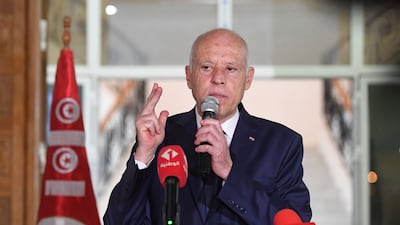Tunisian President Kais Saied on Wednesday announced a partial suspension of the country's constitution and the extension of extraordinary measures which have barred Parliament from performing its duties and revoking the immunity of its members.
The announcement, which was made on the Presidency's Facebook page, stated that sections of the constitution in conflict with the President's extraordinary measures would be suspended, along with the work of Parliament. In its absence presidential decrees can serve as legislation and MPs would no longer be paid their salaries or enjoy any parliamentary privileges, the statement said.
It also said Mr Saied would form a committee to prepare amendments to Tunisia's constitution, one of the leader's primary objectives since the earliest days of his campaign.
Critics accused Mr Saied of a coup in July, when he sacked the prime minister, froze the activities of parliament and assumed sole authority of the country after invoking an article in the constitution which enables the president to implement a 30-day exceptional period in times of imminent danger to the country.
In the absence of a Constitutional Court, which had not been seated in part due to the president's rejection of a law changing how the judges would be appointed, Mr Saied extended those measures indefinitely in August.
Mr Saied has repeatedly affirmed that his actions are in line with the governing principals of the constitution.
Monica Marks, an assistant professor of Middle East politics at NYU Abu Dhabi and a close watcher of Tunisia, says that Mr Saied's actions put the country’s first democratically representative constitution in jeopardy.
"Tunisia’s constitution passed in 2014 with near unanimous support after years of parliamentary wrangling and exhaustive consultations with Tunisian civil society," she said.
If the President pushes through changes by decree it risks destroying "something that so many Tunisians fought incredibly hard to achieve after decades of dictatorship".
Earlier this month, palace aide Walid Hajjem told Sky News Arabia that the president intended to put forward amendments to the 2014 constitution, which was drafted by a constituent assembly in the wake of the 2011 revolution, for a nationwide referendum.
The move has been criticised by both allies and opponents of Mr Saied, who are calling for dialogue and inclusion in creating a new political system.
Several parties that initially backed Mr Saied after July 25th have in recent weeks distanced themselves from the president as he has grown more isolated and failed to appoint a new prime minister despite repeated assurances he would do so.
Mohamed Abbou, co-founder of centre-left party Attayar, this week said on Jawhara FM radio that a referendum could render Mr Saied "illegitimate". He criticised the president for casting aside a constitution he swore an oath to defend.
Tunisia's powerful General Tunisian Workers' Union (UGTT) has also rejected unilateral amendments to the country's constitution. Earlier in the month they put forward their own detailed roadmap out of the crisis, including updating electoral law and holding snap elections, but reaffirmed their commitment to the 2014 constitution.











